Syria rebels move HQ from Egypt to Turkey

Free Syrian Army fighters carrying weapons run to take cover from snipers loyal to Syrian President Bashar al-Assad in Aleppo’s Qastal al-Harami. REUTERS Photo
 Barçın Yinançbarcin.yinanc@hurriyet.com.tr
Barçın Yinançbarcin.yinanc@hurriyet.com.trMany Syrian dissidents are leaving the country, and the main headquarters of the SNC is being moved to Turkey, Khaled Khoja told the Hürriyet Daily News. “Many Syrian opposition figures are leaving Egypt, Mouaz al-Khatib, the former head of the Syrian National Coalition, has plans to settle in Turkey.”
Al-Khatib had resigned in recent months protest at the world’s “inaction” over violence in Syria.
The coup has had a negative effect on the Syrian opposition according to Khoja, who said some of the pro-opposition decisions which were taken during Morsi’s presidency were overturned under the new administration.
“Just a few days before the coup, a meeting on Syria took place in Cairo. Morsi had said they would freeze diplomatic relations with the Bashar al-Assad regime. Right after the coup, this decision was overturned and the new regime said they would upgrade relations with Syria,” Khoja said.
Egyptian Interim Foreign Minister Nabil Fahmy said last month that the country continued to support the Syrian uprising but that Cairo had no intention of “waging jihad” in Syria. Fahmy said Morsi’s decision to cut diplomatic ties with war-torn Syria would be “re-examined,” while stressing that did not mean they would “resume or not resume.”
He said Egypt’s new military rulers had re-imposed a visa regime on Syrians, who used to enjoy visa-free travel even during the times of Hosni Mubarak, who ruled the country for decades before being toppled by a popular uprising two years ago.
Khoja also said a lynch campaign was being conducted against Syrians in Egypt.
August/17/2013
http://rt.com/news/beirut-hezbollah-blast-dead-541/
( Regional quagmire ? )
At least twenty people have been killed and 150 wounded in an explosion near the Hezbollah headquarters in Lebanese capital Beirut, according to security sources. Sunni radicals have claimed responsibility for the sectarian attack.
"This is the second time that we decide the place of the battle and its timing...And you will see more, God willing," said a video statement from a group calling itself Brigades of Aisha, addressed to Hezbollah leader Hassan Nasrallah. Hezbollah represents a rival Shi'ite offshoot of Islam.
A car bomb detonation near the same location last month wounded 53 people.
http://news.antiwar.com/2013/08/14/al-qaeda-ousts-free-syrian-army-from-key-city/
Al-Qaeda Ousts Free Syrian Army From Key City
FSA's Rasoul Brigade Flees to Turkey After Losing HQ
by Jason Ditz, August 14, 2013
Suggestions that the Syrian rebel factions unify into a “National Free Army” seem more unlikely than ever today, after another major conflict between two rebel factions, with al-Qaeda in Iraq (AQI) fighters attacking the Free Syrian Army (FSA).
 The fighting took place in Raqqa, where AQI fighters overran the FSA’s Ahfad al-Rasoul brigade, capturing the group’s headquarters and forcing its fighters to flee into neighboring Turkey.
The fighting took place in Raqqa, where AQI fighters overran the FSA’s Ahfad al-Rasoul brigade, capturing the group’s headquarters and forcing its fighters to flee into neighboring Turkey.
Rebels familiar with the situation say that the fighting over Raqqa had been going on off and on for months, but picked up in the past week. Two of the FSA commanders were killed in a car bombing at the city’s train depot earlier today.
The overall toll of the fighting is unclear, but Raqqa has been the site of multiple protests, with locals angry that they are being occupied by foreign factions, and that those factions are constantly at odds.
Egypt....... 525 killed , 3572 injured in the big crackdown.....
http://rt.com/news/egypt-bloodshed-condemnation-future-519/
The Egyptian military’s crackdown on supporters of ex-President Mohamed Morsi has plunged the world’s most populous Arab nation into its worst violence for decades. The country is teetering between a return to Mubarak-era autocracy and civil war.
Egyptian security forces interrupted a six-week-long stand-off with Morsi’s Muslim Brotherhood on Wednesday, launching a crackdown on two sit-in camps in Cairo. The troops used armored bulldozers, tear gas and bird shot to level and burn down tent camps, where people demanding Morsi’s reinstatement as president were staging an around-the-clock protest.
In the ensuing clashes, which spilled out of the Egyptian capital to other towns and cities around the country, at least 525 people were killed and 3,572 injured, according to a Thursday tally of the country’s Health Ministry. The opposition claims that the number of casualties was much higher, with a Muslim Brotherhood spokesman saying more than 4,500 people have been killed in what he described as a “massacre.”
At least 43 people of those killed were security troops, indicating the intensity of violence that both sides resorted to. The Egyptian police and Morsi supporters accused each other of using firearms in the clashes, with state media showing home-made firearms and ammunition confiscated by the police at the protest camps.
The Muslim Brotherhood announced on Thursday plans to hold a protest march in defiance of the government’s crackdown and state of emergency.
"Marches are planned this afternoon from Al-Iman mosque to protest the deaths," the defiant Islamist group said in a statement.
Wednesday’s violence also saw the deaths of four journalists, including Mick Deane, a 61-year-old Sky News cameraman. Fatalities among media professionals, who usually wear clothing and equipment identifying them as journalists, are rare in countries not engaged in warfare.
The crackdown on the protesters included arrests of several Muslim Brotherhood leaders. Security officials claimed that Brotherhood leaders were instructing their followers to attack police stations in the country. In the wake of the day of clashes, the government announced a month-long state of emergency and a dusk-to-dawn curfew.
The violence also had a clear religious angle to it, when Morsi supporters targeted at least three Coptic Christian churches in towns of Minya, Sohag and Assiut. Coptic Christians, who comprise some 10 percent of Egypt’s population of 84 million, have complained that the rise of the Brotherhood after the toppling of longtime President Hosni Mubarak led to increased persecution of Egypt’s Christians. Many Coptic Christians welcomed last month’s military coup that deposed Morsi.
The clashes increased the strain on Egypt’s interim government, with liberal Vice President Mohamed ElBaradei resigning Wednesday evening in protest against the military crackdown.
"It has become difficult for me to continue bearing responsibility for decisions that I do not agree with and whose consequences I fear. I cannot bear the responsibility for one drop of blood," ElBaradei said in his resignation letter to the country’s interim president.
Other liberal members of the interim government did not follow ElBaradei’s lead, but his departure from the administration cast doubt over the prospects of the armed forces being able to form an inclusive and efficient government.
The military seem determined to continue their hard-fisted treatment of the Muslim Brotherhood. Interior Minister Mohamed Ibrahim vowed to restore Mubarak-era security to the country.
"I promise that as soon as conditions stabilize and the Egyptian street stabilizes, as soon as possible, security will be restored to this nation as if it was before January 25, and more," he said in a reference to January 25, 2011, the day when the huge demonstrations began that led to Mubarak’s downfall.
Since the 2011 revolution, Egypt’s security and already-weak economy have been gradually deteriorating as the country descends into intensified power struggles and weak governance. Under the rule of Mubarak, the Muslim Brotherhood remained illegal, due to its past alleged involvement in political assassinations.
The military’s apparent wish to return to Mubarak-style rule indicates that the generals have failed to appreciate the changes in Egyptian society that have occurred since the ousting of the long-time leader in 2011, journalist and author Hugh Miles told RT.
“Islamism has become extremely popular, and what we’re really seeing now in Egypt is a clash between people who want Islam as their frame of reference, against people who want a more secular kind of European-style frame of reference,” Miles told RT. “And that’s a very fundamental divide. It divides families and it divides Egypt. Probably, roughly half-and-half is the best guess.”
After Wednesday’s violence, several international organizations and countries, including the US, criticized the Egyptian military for the violent crackdown on the Muslim Brotherhood. US Secretary of State John Kerry described the events as “deplorable,” a word seldom used by diplomats.
Washington reportedly has threatened to cancel its main annual joint military exercise with Egypt, which has been a symbol of US support of the Egyptian military since the signing of the Camp David peace accords between Egypt and Israel in 1978. The US provides some $1.3 billion in military aid and about $250 million in economic aid a year to Egypt. Some observers say this aid could be used to put pressure on the current Egyptian leadership to moderate its authoritarian rule.
Some Egypt-watchers believe that the US is reluctant to use its financial leverage, however, due to a fear of antagonizing the Muslim country and compromising the security of its neighbor, Israel. The strain in relations was clear in the most recent US attempt to mediate in the ongoing crisis, when Senators John McCain and Lindsey Graham last week pleaded with the Egyptian military to reinstate Morsi, only to receive a sharp rebuff.
“Egypt's new military regime and a sizable and vocal portion of the Egyptian population have made it very clear that they just want the United States to leave it alone,” political analyst Marc Lynch argued in the online magazine Foreign Policy. “For once, Washington should give them their wish. As long as Egypt remains on its current path, the Obama administration should suspend all aid, keep the embassy in Cairo closed, and refrain from treating the military regime as a legitimate government.”
Egypt’s government finances are currently running low, so Cairo to a large degree relies on international aid and loans to provide even basic commodities like wheat and fuel. Critics of Morsi say during his year as president he was more interested in sidelining the secular opposition than in carrying out much-needed reforms.
The strongest international condemnation of Wednesday’s crackdown came from Turkey, whose moderate Islamist government has been a firm supporter of the Egyptian branch of the Muslim Brotherhood. Ankara called on the UN Security Council and the Arab League to stop the “massacre.” Several other countries in the region, including Iran, Tunisia, the Arab Emirates and Qatar, also criticized the crackdown.
http://rt.com/news/journalists-dead-egypt-protests-498/
Four journalists killed covering Egypt clashes
Four journalists have been killed in violent clashes which swept Egypt on Wednesday, with a number of the press core suffering serious injuries in the clashes. At least 238 civilians died in total as security forces brutally broke up pro-Morsi rallies.
Egypt has been swept by horrific street violence, showers of gunfire, blazing fires and tear gas as relentless clashes have shaken cities in government attempts to break up the demonstrations.
****
The violence also took the lives of Sky News cameraman Mick Deane and Dubai-based XPRESS journalist Habeeba Abdelaziz. Both had been covering the pro-Morsi protests in Egypt’s capital which security forces began to ‘disperse’ earlier in the day.
Deane, 61, was shot as he was documenting the turmoil in Cairo. Despite receiving medical treatment for his injuries he died shortly afterwards, according to a statement from Sky.
“He was an astonishingly good cameraman, took some brilliant pictures,” said John Ryley, head of Sky News.
Habeeba Abdelaziz was a 26 year old Egyptian reporter from Dubai, who worked for XPRESS – a ‘sister’ publication to the country’s Gulf News.
“It’s hard to believe she’s gone. She was passionate about her work and had a promising career ahead,” XPRESS Deputy Editor Mazhar Farooqui told Gulf News, commenting that the entire team was in a state of shock.
Abdelaziz had been covering protests near Cairo’s Rabaa al-Adawiya Mosque, which has been the site of one of the largest protests for over a month, and a subsequently heavy-handed crackdown by governmental security forces. They reclaimed the area late on Wednesday.
Habeeba Abdelaziz was a 26 year old Egyptian reporter from Dubai, who worked for XPRESS – a ‘sister’ publication to the country’s Gulf News.
“It’s hard to believe she’s gone. She was passionate about her work and had a promising career ahead,” XPRESS Deputy Editor Mazhar Farooqui told Gulf News, commenting that the entire team was in a state of shock.
Abdelaziz had been covering protests near Cairo’s Rabaa al-Adawiya Mosque, which has been the site of one of the largest protests for over a month, and a subsequently heavy-handed crackdown by governmental security forces. They reclaimed the area late on Wednesday.
The third journalist killed was Egyptian Ahmed Abdel Gawad of Al Akhbar newspaper. He died while covering the clashes at Rabaah al-Adawiya. The Egyptian Press Syndicate, a journalist union, confirmed Gawad's death, but did not provide any details.
The fourth reporter to have been confirmed killed is photojournalist Mosab El-Shami Rassd of the news website (RNN), an alternative pro-Islamist media network, Ahram online reports. The agency wrote that he “was killed by the hand of betrayal while covering the Rabaa massacre at the hands of those who executed the coup,” wrote the network on its Facebook page.
Reuters photojournalist Asmaa Waguih also suffered serious injuries after being shot in the leg during protests. Shortly afterwards, she was moved to the international medical center to receive treatment. The Committee to Protect Journalists has released a statement on the issue, saying that the group condemned the killing of Sky News cameraman Mick Deane, prior to hearing of the second death.
Reuters photojournalist Asmaa Waguih also suffered serious injuries after being shot in the leg during protests. Shortly afterwards, she was moved to the international medical center to receive treatment. The Committee to Protect Journalists has released a statement on the issue, saying that the group condemned the killing of Sky News cameraman Mick Deane, prior to hearing of the second death.
“We call on Egyptian authorities to issue clear orders to security forces to respect the right of journalists to work freely and safely while covering events in Cairo and the rest of the country,” said CPJ Deputy Director Robert Mahoney.
“The killing of Mick Deane underscores the urgent need for such action and for all sides to show restraint and allow the media to do their job. The authorities must investigate all attacks on journalists and hold those responsible to account,” he said.
Other journalist were also treated for wounds. An AP photographer was hit in the back of the neck by two birdshot pellets, while Al Jazeera claims its cameraman Mohammed al-Zaki was shot in the arm. In addition, Paris-based Reporters Without Borders says that Tarek Abbas — a reporter for local Al-Watan newspaper sustained gunshot wounds to his leg and eye; and photographer Ahmad Najjar was wounded in the arm.
Approximately a dozen other journalists were arrested or threatened as they tried to document the mayhem: Reuters’ Tom Finn tweeted his own arrest. Daily Beast reporter Mike Giglio also said on Twitter he was arrested alongside two photographers named Mahmoud Abou Zeid and Louis Jammes, stating they had been beaten too.
A state of emergency was declared on Wednesday after Egyptian security forces violently broke up the sit-in camps of Muslim Brotherhood supporters in Cairo. Health Ministry officials say that over 2000 were injured in the nationwide violence, alongside the 278 who were killed including policemen.
“The dead are both from police and civilians,” said the ministry's spokesman, Hamdi Abdel Karim.
However, Muslim Brotherhood spokesman Gehad El-Haddad claimed that as many as 2,000 people had been killed and 10,000 injured in the police operation.
Security forces succeeded in gaining control of the protest camps by the end of the day after turning the capital into what journalists called “a war zone”. A state of emergency has been declared and curfew imposed in major cities including Cairo, Alexandria and Suez. The curfew is set to last for the next month – or until further notice.
A state of emergency was declared on Wednesday after Egyptian security forces violently broke up the sit-in camps of Muslim Brotherhood supporters in Cairo. Health Ministry officials say that over 2000 were injured in the nationwide violence, alongside the 278 who were killed including policemen.
“The dead are both from police and civilians,” said the ministry's spokesman, Hamdi Abdel Karim.
However, Muslim Brotherhood spokesman Gehad El-Haddad claimed that as many as 2,000 people had been killed and 10,000 injured in the police operation.
Security forces succeeded in gaining control of the protest camps by the end of the day after turning the capital into what journalists called “a war zone”. A state of emergency has been declared and curfew imposed in major cities including Cairo, Alexandria and Suez. The curfew is set to last for the next month – or until further notice.
Brotherhood plans Cairo march after crackdown |
Islamist group calls for rally day after security forces mounted bloody clampdown on its members that killed hundreds.
Last Modified: 15 Aug 2013 10:02
|
| Egypt's Muslim Brotherhood has said it planned to march in the capital, Cairo, reiterating it remained committed to a peaceful struggle, a day after hundreds of its supporters were killed in a bloody security crackdown in the capital. "Marches are planned this afternoon from Al-Iman mosque to protest the deaths," the Islamist group said in a statement on Thursday even as the country remained in a state of emergency. World leaders condemned the attack on protesters camped out in the Egyptian capital calling for reinstatement of Mohamed Morsi, country’s first freely elected president, who was deposed by the army on July 3. "We will always be non-violent and peaceful. We remain strong, defiant and resolved," Brotherhood spokesman Gehad El-Haddad wrote on his Twitter feed. "We will push (forward) until we bring down this military coup," he added. Nationwide protests, including Alexandria and numerous towns and cities, erupted after the Cairo crackdown that left at least 421 people dead. An Egyptian Health Ministry spokesman, Khaled el-Khateeb, told The Associated Press on Thursday that the number of injured in the previous day's violence had risen to 3,572. The military-installed government defended the clamp down, saying the authorities had no choice but to act. The curfew clamped overnight was relaxed in the morning and traffic started flowing through the areas where clashes occurred on Wednesday. Police and troops used bulldozers, teargas and live fire to clear out two Cairo sit-ins that had become a hub of Muslim Brotherhood resistance to the military after it deposed Morsi. At the site of one Cairo sit-in, garbage collectors cleared still-smouldering piles of burnt tents on Thursday. Soldiers dismantled the stage at the heart of the protest camp. A burnt out armoured vehicle stood abandoned in the street. Call for UN debate In Ankara, Turkish Prime Minister Tayyip Erdogan called on Thursday for the UN Security Council to convene quickly and act after what he described as a massacre in Egypt. "Those who remain silent in the face of this massacre are as guilty as those who carried it out. The UN Security Council must convene quickly," he told a news conference. The Muslim Brotherhood has said the true death toll was far higher, with a spokesman saying 2,000 people had been killed in the "massacre". It was impossible to verify the figures independently given the extent of the violence. The military-installed government has declared a month-long state of emergency and imposed the dusk-to-dawn curfew on Cairo and 10 other provinces, restoring to the army powers of arrest and indefinite detention it held for decades until the fall of autocrat Hosni Mubarak in a 2011 popular uprising. Vice President Mohamed ElBaradei, a Nobel Peace Prize winner who lent liberal political support to the ousting of Egypt's first freely elected president, resigned in dismay at the use force instead of a negotiated end to the six-week stand-off. Other liberals and technocrats in the interim government did not follow suit. Interim Prime Minister Hazem el-Beblawi spoke in a televised address of a "difficult day for Egypt" but said the government had no choice but to order the crackdown to prevent anarchy spreading. "We found that matters had reached a point that no self-respecting state could accept," he said. |
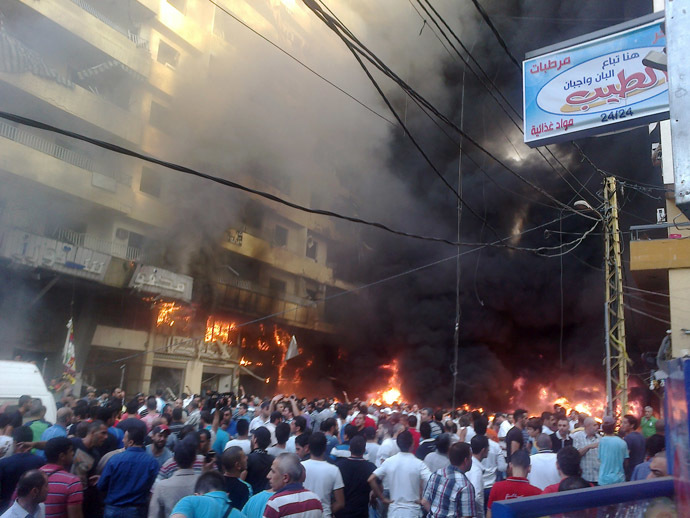

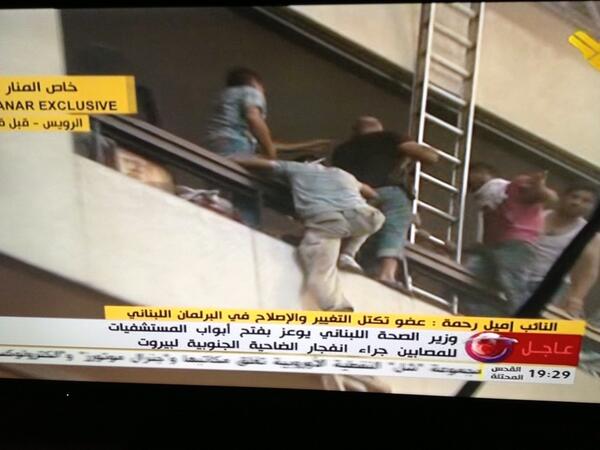


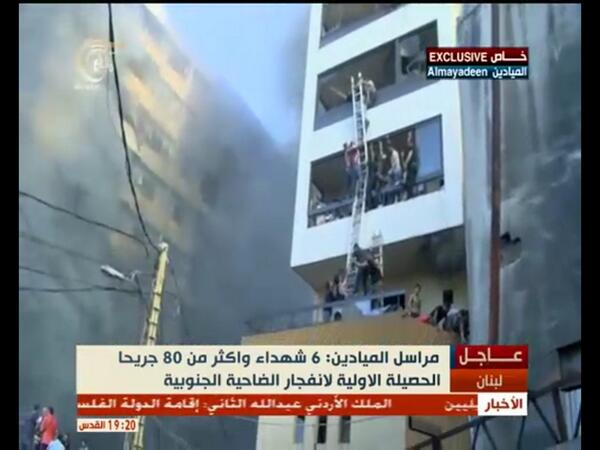
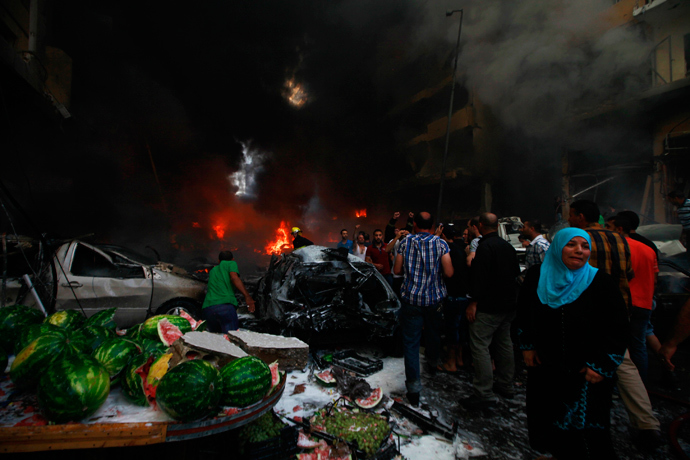


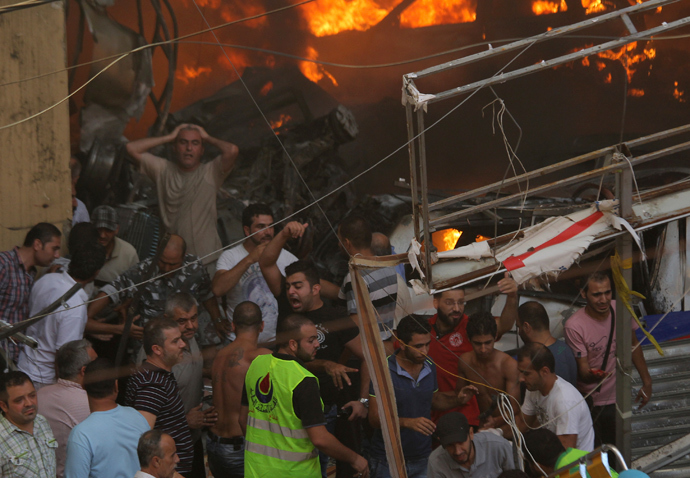

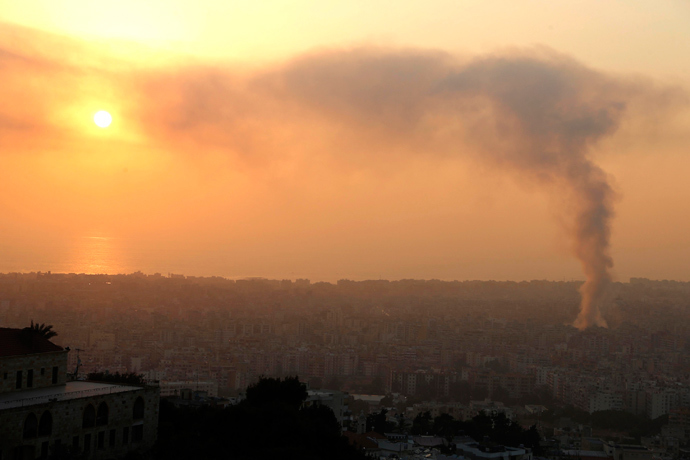

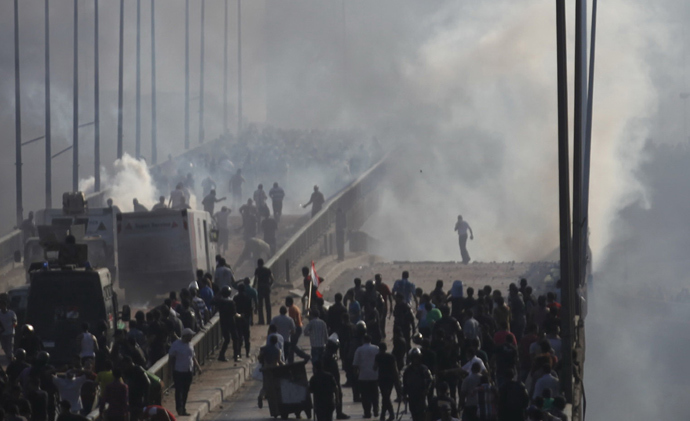
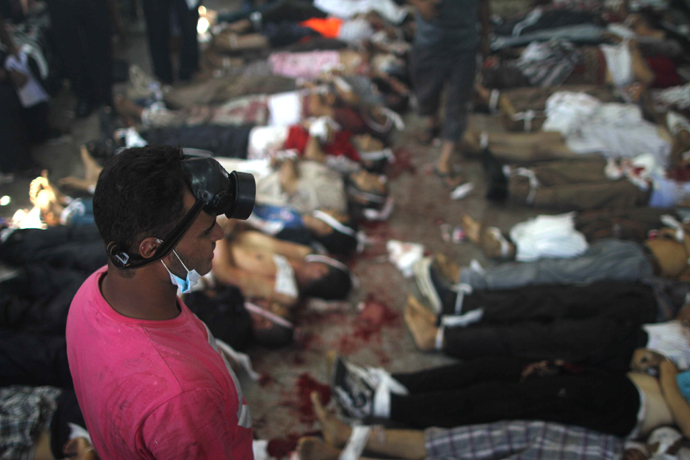
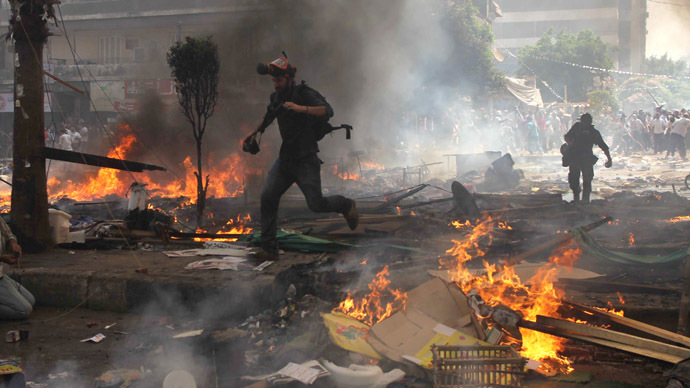

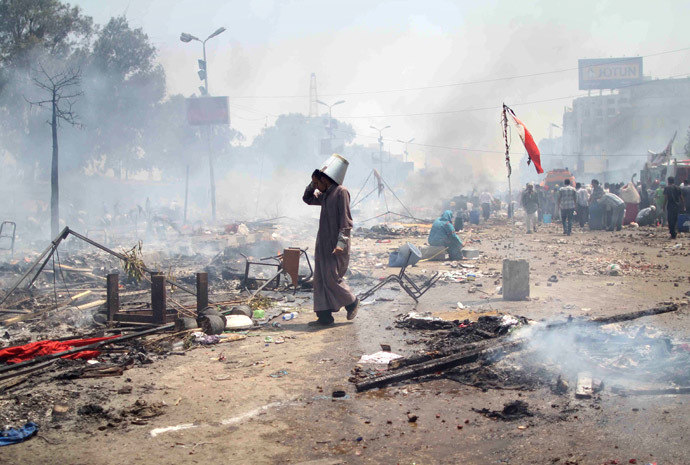





No comments:
Post a Comment